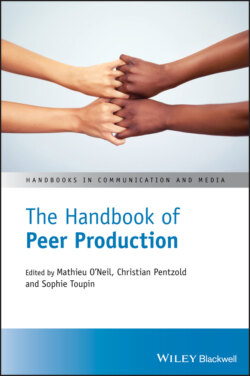Читать книгу The Handbook of Peer Production - Группа авторов - Страница 97
5 Openness
ОглавлениеIn Benkler’s famous formulation, the success of peer production is dependent on several factors related to the envisioned product, namely that there is low uncertainty about what constitutes quality and that the product is modular and granular, meaning it can be split into independent parts and allows for both smaller and greater sized contributions. This means the project is suited for decentralized, self‐selecting producers of different levels of expertise and differing levels of commitment). What may go missing in such an economic analysis is that peer production requires more than a set of affordances, rules and procedures, and is arguably dependent on a kind of moral education of its participants. As Pentzold (2011) argues in the context of Wikipedia, participants understand the glue tying their community together not as the bureaucratic governance structure (consisting of wiki software and all of the rules and regulations guiding decision‐making on Wikipedia), but rather as shared values. “[U]sers primarily understand their collective as an ethos‐action community tying community membership not to admission procedures but to the personal acceptance of a set of moral obligations and rules of conduct” (Pentzold, 2011, p. 716). Logically, such personal acceptance will arise not just from existing preferences and previously held beliefs, but also through processes of socialization and education. An example of such moral education in service of peer production is Debian’s New Member Protocol, a form of apprenticeship that also requires an individual essay presenting one’s views on the value of open source (Coleman, 2013, p. 124)
The moral education involved in peer production will be geared towards several shared values, obligations, and rules of conduct. Perhaps most importantly, however, is instilling a disposition of openness, understood as tendencies toward humility and empathy that we associate with an “open mind.” Here it is important to see that openness is not a straightforward concept, and can refer to different things including the free access of information and technology (as in “open source code”), or a liberal political philosophy (Tkacz, 2014). The “open‐mindedness” I focus on here is a crucial part of what Reagle defines as the larger meaning of openness in Wikipedia and similar communities, namely as “an accessible and flexible type of collaboration whose result may be widely shared” (Reagle, 2012, p. 75, emphasis in original). As Reagle notes, Wikipedia’s famous policy of “neutral point of view” (NPOV) is often misunderstood as a kind of positivist notion of truth. However, in practice it is pursued “rather as a stance of dispassionate open‐mindedness” (Reagle, 2012, p. 56). In other words, neutrality and openness are articulated as an attitude or disposition.
On Wikipedia, such openness‐as‐disposition is encoded and enacted in different ways. Perhaps most important among these is the colloquial Wikipedia norm of “assuming good faith” (“Wikipedia,” 2019). Assuming good faith means taking opposing views seriously and a willingness to entertain the view that one’s own perspective is incomplete and flawed. Although prolonged flame wars get the most attention, as Reagle points out these are outweighed by civil interactions where compromise is sought and good faith is assumed on all sides. A related practice that Wikipedia encourages is “writing for the opponent” (“Wikipedia,” 2018). This challenges editors to spend more time writing and polishing points of view they themselves do not hold. Here, the guideline can be read in two ways: on the one hand it encourages openness through exposure to difference; on the other it suggests this is also the best way to convince others of your own arguments (which of course somewhat violates the principle of good faith). Regardless, it remains a practice that requires some degree of empathy and respect (Reagle, 2012, p. 58).
Importantly, while openness is often understood as an organizational goal or requirement in peer production, it must in fact be a quality of the culture. Source code that anyone can see, an encyclopedia that anyone can edit, this form of openness is relatively easy to implement and sustain through licensing. But openness in terms of remaining open to new, diverse, and challenging ideas, and to change more generally – this will never be easy, due to the hierarchical structures that emerge in any social organization. There is also evidence that growth itself in peer production projects leads to conservatism: Halfaker (Halfaker et al., 2013) show that Wikipedia’s solutions to its enormous growth over the years – formalizing policies and guidelines, using software to do mass reverts of suspect contributions, etc. – have the unintended consequence of rejecting the contributions of desirable participants, and thus discouraging them from investing more time in the project. Therefore, peer production projects must find ways to foster and maintain openness through various formal and informal means of education and socialization.
